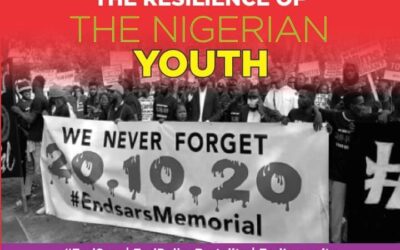On 16 May 2006, the Upper House of the legislature in Nigeria took the unprecedented and generally unexpected step of halting the debate on the controversial constitution of the Federal Republic of Nigeria 1999 (Amendment Bill) 2006. The bill, which had passed the first reading foundered on the second reading chiefly because the majority of senators opposed what was to become the focal point of the bill, namely section 137(2) which, if successful would have provided for an elongation of the presidential tenure in the constitution. What that particular section sought to achieve was to extend from two to three, the number of times a president was permitted to be elected to the position. If successful, that amendment would have applied, mutatis mutandis to the tenure for state governors, a provision that was reflected in section 182 of the draft.
The bill failed to pass the second reading because these particular clauses were, understandably, mired in considerable controversy. The draft bill, containing some 116 clauses, contained proposed amendments to the 1999 constitution with considerably far reaching consequences founded on some of the most difficult and enduring issues affecting the political, economic and sociological make up of Nigeria. The next day, the House of Representatives followed suit. By these actions, they brought to an end the most keenly watched illustration of shadow boxing ever to occur in Nigerian politics. Its landmark effect on the development of Nigerian politics will be discussed in years to come, as also its consequence in defining the geography of the progress of Nigeria’s democracy. What is underscored by this unparalleled circumstance is its effect on the depth of the development of Nigeria’s democracy and the fact that even in the most unpredictable of circumstances, the democratic structures and individuals charged with the responsibility demonstrated, in large measures, the capacity and capability to uphold the challenge of the sustaining the fragile democratic foundations of the nation. The uniqueness of the contributions of the legislators must be praised in the highest form, more so because their actions have illustrated the practical application of the doctrine of separation of powers, a feature hitherto academic in its existence in Nigeria’s tenuous political framework. This outcome was not achieved without the quite vociferous stands mounted by several individuals and interest groups, with analyses and protests remarkable in the manner in which these united behind one position. For probably the first situation in many years, positions taken did not appear to be sharply divided along ethnic or even ideological lines. The true victor, we believe, is democracy and the principles that its presence in governance has so desperately cried out for since independence in 1960.
As the dust settles, it has become increasingly clear that the conclusion of the debate and the demise of tenure elongation has brought with it consequences which may carry as great a cost as its successful conclusion. Prior to the emergence of tenure elongation, some of the issues contained in the bill formed the subject of the most intense agitation; angst; debate; riots and strikes; political jostling and posturing ever seen in Nigerian politics. These were encapsulated in so many developments, some of which, even sadly, led to the loss of lives. The agitation for a Sovereign National Conference to provide a platform for a discussion of all the critical issues essential to the advancement of “Project Nigeria” reached such a sky high crescendo that the Federal Government provided a fait accompli in convening of the National Political Reform Conference. This did very little to assuage those like ourselves who felt that more should be done. A large number of issues that were distilled from the discussions at the conference appear to have found its way into the draft bill for further consideration. These made up the 116 separate proposals.
Some of the most important issues include the recognition of the emergence of the 6 geo-political zones; strengthening of local government as a third tier of Government; creation of the constitutional role for traditional rulers; direct line charge payment to National Assembly and INEC; introduction of independent candidacy in elections; the establishment of the Independent Office of the Attorney General; the principle of rotation; the amendment of section 308 of the constitution in relation to immunity, among many others.
Our concern, as an organisation, is that these issues were at the forefront of burning national questions, the uncertainty of which presented such a divisive effect on nation building. The draft bill contained 116 proposals to amend 116 separate sections of the constitution. It seems to us that each proposal was, by its own uniqueness, a strong; independent; noteworthy and quite separate expression of desire to amend existing law and by consequence practices thereto. The debate that ensued in the houses of legislature were clearly preoccupied by tenure elongation and paid limited – indeed insufficient – attention to the other proposals. In short, appears to have been a debate that was centred essentially on one single proposal. What happened therefore is that once the debate on tenure elongation failed, the entire bill itself was deemed to and by consequence failed.
NAS believes that in the approach by which the debate was presented in both houses, the bill intending to put forward for serious consideration, some of the most engaging problems of the country, was doomed to perish to technicality as the only inevitable outcome was failure. Section 9 of the constitution provides the mechanics for amending the constitution. Simply, such alteration of the constitution shall not be valid unless it is passed in either House of the National Assembly supported by votes of not less than 2/3 majority of all the members of that House and approved by the resolutions of the Houses of Assembly of not less than 2/3rds of all the states. Closer examination of the constitutional provisions clearly shows that a debate in general terms of all 116 proposals was bound to produce this result. This approach, we believe, demonstrates a derisory, even contemptible listlessness with which the other considerable aspects of the bill were treated. It was always necessary that there would have been an individual approach to each proposal and the manner in which the debate on the bill was treated with the sole emphasis on tenure elongation would have led to a constitutional absurdity even if it had succeeded. We believe that sections 137 and 182 relating to tenure elongation should have been excised from the bill and the significantly important debates in relation to the other proposals could have and should have proceeded with the attention and despatch that they deserve.
We do not underscore the significance of what has happened in the development of Nigeria’s democracy. Far from it. Our organisation is enthused by the outcome especially because it restores belief to the seriously corroded confidence that the Nigerian has had in the democratic structures in the country. That said, key issues relating to our social and economic development which still fall for further and more decisive resolution now remain essentially cast aside. This is the true cost of this debate. The issues should have been and could have been split up in a manner that required neither the artistic ability of a ballerina nor Solominic wisdom. Those responsible for creating this situation must act fast lest their bona fides be questioned needlessly. NAS believes that the earlier those issues that have been put aside are placed before the National Assembly for deserved consideration, the quicker Nigerians will gain from the developments of recent weeks especially with the imminent distraction of the 2007 elections looming in the immediate horizon. It is only by doing so that the Nigerian nation will see truly reap the desired benefits because the country must now turns its attention to the actualisation of its expectations that the necessary constitutional amendments required to create the statutory framework for a much desired assault on the travesties that have occurred for so long can now begin.
Signed:
ANDREW OBINNA ONYEARU
NAS Capone
National Association of Seadogs (NAS)
1 June 2006



